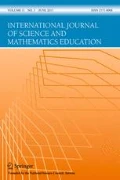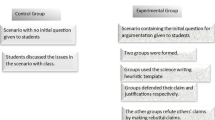Abstract
This study explored the effects of arguing to learn in a socioscientific context on the fundamental and derived components of reading, writing, and science understanding as integral parts of science literacy. We adopted mixed-methods in which the 1-group pretest–posttest design with supplemental interviews and questionnaires. The pretest evaluated the dependent variables (reading and writing scores), the treatment was arguing to learn about the global climate change issue, the posttest evaluated the dependent variables, and follow-up questionnaires and interviews informed the quantitative results. An intact grade six class (N = 28) at an urban elementary school located in central Taiwan was the participants. Analyses of the pretest–posttest gain scores and correlations between these outcomes revealed significant (p < 0.05) improvements in writing and associations among reading, writing, and arguing to learn. Interpretation of the qualitative data (interview and questionnaire responses) supported that argumentation as an instructional treatment focused on fundamental literacy could play a positive role in facilitating students’ enhanced science understanding (derived literacy).


Similar content being viewed by others
References
Balgopal, M. & Wallace, A. (2013). Writing-to-learn, writing-to-communicate, & scientific literacy. The American Biology Teacher, 75(3), 170–175.
Chin, C.-C., Yang, W. C. & Tuan, H.-L. (2010). Exploring the impact of guided TAPping scientific reading-writing activity on sixth graders. Chinese Journal of Science Education, 18(5), 443–467.
Erduran, S., Simon, S. & Osborne, J. (2004). TAPping into argumentation: developments in the application of Toulmin’s argument pattern for studying science discourse. Science Education, 88, 915–933.
Falk, H. & Yarden, A. (2009). “Here the scientists explain what I said”. Coordination practices elicited during the enactment of the results and discussion sections of adapted primary literature. Research in Science Education, 39, 349–383.
Fleener, C. E. & Bucher, K. T. (2004). Linking reading, science, and fiction books. Childhood Education, 80(2), 76.
Florence, M. K. & Yore, L. D. (2004). Learning to write like a scientist: coauthoring as an enculturation task. Journal of Research in Science Teaching, 41, 637–668.
Gunel, M., Hand, B. & Prain, V. (2007). Writing for learning in science: a secondary analysis of six studies. International Journal of Science and Mathematics Education, 5, 615–637.
Hand, B. & Prain, V. (2006). Moving from border crossing to convergence of perspectives in language and science literacy research and practice. International Journal of Science Education, 28, 101–107.
Jiménez-Aleixandre, M. P. & Erduran, S. (2008). Argumentation in science education: an overview. In S. Erduran & M. P. Jiménez-Aleixandre (Eds.), Argumentation in science education: perspectives from classroom-based research (pp. 3–27). Dordrecht, Netherlands: Springer.
Norris, S. P. & Phillips, L. M. (2003). How literacy in its fundamental sense is central to scientific literacy. Science Education, 87, 224–240.
Nussbaum, M. E. (2002). Scaffolding argumentation in the social studies classroom. The Social Studies, 93(3), 79–84.
Osborne, J., Erduran, S. & Simon, S. (2004). Enhancing the quality of argumentation in school science. Journal of Research in Science Teaching, 41, 994–1020.
Pearson, P. D., Moje, E. B. & Greenleaf, C. (2010). Literacy and science: each in the service of the other [Special Issue]. Science, 328(5977), 459–463.
Phillips, L. M. & Norris, S. P. (2009). Bridging the gap between the language of science and the language of school science through the use of adapted primary literature. Research in Science Education, 39, 313–319.
Prain, V. (2006). Learning from writing in secondary science: some theoretical and practical implications. International Journal of Science Education, 28, 179–201.
Romance, N. R. & Vitale, M. R. (1992). A curriculum strategy that expands time for in-depth elementary science instruction by using science-based reading strategies: effects of a year-long study in grade four. Journal of Research in Science Teaching, 29(6), 545–554.
Saddler, B. & Andrade, H. (2004). The writing rubric. Educational Leadership, 10, 48–52.
Sadler, T. D. & Zeidler, D. L. (2005). Patterns of informal reasoning in the context of socioscientific decision making. Journal of Research in Science Teaching, 42, 112–138.
Simon, S., Erduran, S. & Osborne, J. (2006). Learning to teach argumentation: research and development in the science classroom. International Journal of Science Education, 28, 235–260.
Strauss, A. L. & Corbin, J. M. (1998). Basics of qualitative research: techniques and procedures for developing grounded theory. Thousand Oaks, CA:Sage.
Toulmin, S. (1958). The uses of argument. Cambridge, England: Cambridge University Press.
Wallace, C. S. (2004). An illumination of the roles of hands-on activities, discussion, text reading, and writing in constructing biology knowledge in seventh grade. School Science and Mathematics, 104, 70–78.
Wellington, J. & Osborne, J. (2001). Language and literacy in science education. Philadelphia: Open University Press.
Yore, L. D. (2012). Science literacy for all—more than a slogan, logo, or rally flag! In K. C. D. Tan, M. Kim & S. Hwang (Eds.), Issues and challenges in science education research: moving forward (pp. 5–23). Dordrecht, Netherlands: Springer.
Yore, L. D., Pimm, D. & Tuan, H.-L. (2007). The literacy component of mathematical and scientific literacy. International Journal of Science and Mathematics Education, 5, 559–589.
Yore, L. D. & Tippett, C. D. (2015). Reading Science. In R. Gunstone (Ed.), Encyclopaedia of Science Education (pp. tba). Dordrecht, The Netherlands: Springer. doi:10.1007/978-94-007-6165-0_130-2.
Yore, L. D. & Treagust, D. F. (2006). Current realities and future possibilities: language and science literacy—empowering research and informing instruction. International Journal of Science Education, 28, 291–314.
Yu, S.-M. & Yore, L. D. (2013). Quality, evolution, and positional change of university students’ argumentation about organic agriculture during an argument-critique-argument experience. International Journal of Science and Mathematics Education, 11(5), 1233–1254.
Zeidler, D. L., Sadler, T. D., Simmons, M. L. & Howes, E. V. (2005). Beyond STS: a research based framework for socioscientific issues education. Science Education, 89, 357–377.
Ziman, J. (2000). Are debatable scientific questions debatable? Social Epistemology, 14, 187–199.
Acknowledgments
The authors would express our thanks to the grant sponsor: Ministry of Science and Technology in Taiwan (NSC96-2511-S-142-003-MY3), and Professor Larry Yore and Ms. Shari Yore for their kind and helpful advice in preparing this article.
Author information
Authors and Affiliations
Corresponding author
Rights and permissions
About this article
Cite this article
Chin, CC., Yang, WC. & Tuan, HL. Argumentation in a Socioscientific Context and its Influence on Fundamental and Derived Science Literacies. Int J of Sci and Math Educ 14, 603–617 (2016). https://doi.org/10.1007/s10763-014-9606-1
Received:
Accepted:
Published:
Issue Date:
DOI: https://doi.org/10.1007/s10763-014-9606-1




